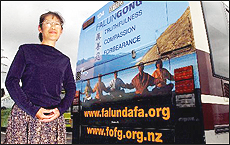
Shelley Shao with one of the bus advertisements. Picture / Fotopress
á
14.02.2002
When Falun Gong practitioner Shelley Shao decided to advertise the group's beliefs, she also planned to make a political statement.
She chose a photograph taken last year that showed Western Falun Gong practitioners in Tiananmen Square protesting at Chinese Government treatment of followers.
Previously, the movement had done newsletter drops to 400,000 homes, and run print advertising. This time, Ms Shao decided to use back-of-bus advertising.
But she soon discovered that such a public medium imposes limitations all of its own, and her chosen picture was too politically fraught to grace the back of Auckland buses.
The photograph showed followers from Europe, North America and Australia who had unfurled a banner and shouted slogans before being swooped on by police, interrogated overnight and expelled from China the next day.
[...]
Ms Shao emigrated from China in 1998 and is now one of about a hundred New Zealand Falun Gong practitioners. The movement's principles are truthfulness, benevolence and forbearance, she says. She wanted to inform the public about treatment of Falun Gong followers.
Dianne Burton, of Dianne Burton Advertising, liaises with private clients for bus advertising through Buspak Advertising Group. It holds exclusive agreements for advertising with StageCoach and Howick and Eastern Buses, among others.
Ms Burton guided Ms Shao through the process.
"We had to be careful," says Ms Burton. "At first Shelley wanted to say how many people had been persecuted, but it's a sensitive political issue."
A better message to push, Ms Burton, argued, was that of peace and Falun Gong's meditation practices. "We guided them around another angle. We felt it was important to get the peaceful message out there."
Ms Shao accepted the advice. Falun Gong, she says, is a non-profit, non-political group. While a positive spin-off from the advertisements would be to encourage more practitioners, the foremost intention was to let people know what Falun Gong was about.
"We want more people to join, but we don't have any way to push that. We also want to let people to know what happened in China," explains Ms Shao.
But it was a toned-down advertisement that eventually adorned the back of a Stagecoach bus for three months. Ms Shao was satisfied with the results, and has now taken a three-month advertising space on the back of a Howick and Eastern Bus. The campaign has cost $10,000, paid for by Falun Gong practitioners.
Outdoor advertising cannot target an audience the way, say, television advertising can. Bus companies and agencies impose their own constraints on advertising.
As Ms Shao found out, the restrictions stymie more contentious campaigns.
"People can't choose what they watch [in outdoor advertising]," explains Buspak managing director Steve O'Connor, "so we have a strict self-regulatory system in place."
Sales and marketing manager Christopher Gin says it's about social responsibility.
[...]
http://www.nzherald.co.nz/business/businessstorydisplay.cfm?storyID=
939116&thesection=business&thesubsection=adandmark&thesecondsubsection=
general&thetickercode=
Category: Falun Dafa in the Media





